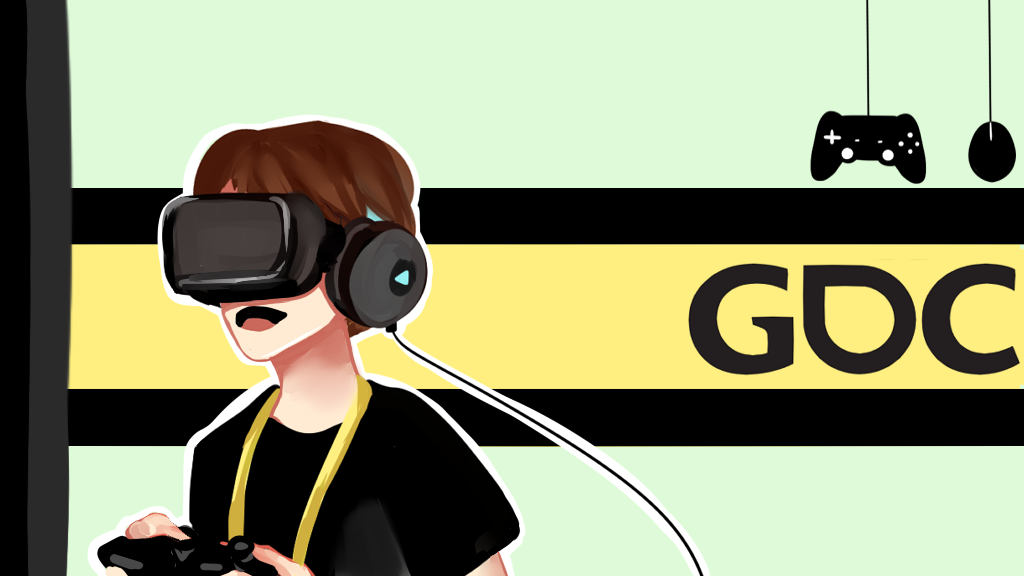Perhaps more than any other conference, GDC (Game Developers Conference) provides a comprehensive picture of the current state of the game development industry. The annual event in San Francisco, CA is the largest, most active gathering of coders, artists, marketers and salespeople with a stake in game development.
RIT has routinely had a presence, and this year over 100 people affiliated with the university attended during the week of Feb. 27 to March 3. Among the attendees were four students from MAGIC Spell Studios, the game development studio within the MAGIC Center.
“Each year, about 27,000 people attend,” explained Jennifer Hilton, assistant director for MAGIC Spell studios and eight-time GDC attendee. “It is the place to see and to be seen if you are in the game development community.” Hilton emphasized just how important and valuable of an experience GDC can be for students. She noted, for instance, that students get the chance to network and learn from other developers.
"I would love it if everyone had the chance to go to GDC, at least once,” said Hilton.
“This is really that first opportunity for many to make those connections," said Hilton. "I would love it if everyone had the chance to go to GDC, at least once.”
Showcasing "Gibraltar"
One of the students experiencing GDC for the first time was John Miller, a third-year Game Design and Development major.
“It was giant, it almost felt like a big carnival,” recalled Miller. Attending GDC was of particular importance for Miller, as he is the lead designer of Gibraltar: a turn-based strategy game under development at the MAGIC center. This year, he was given the opportunity to present the game at GDC, where others could play Gibraltar and even critique it.
“Obviously there was constructive criticism, but it was a lot less than expected. And the game didn’t break, which is always a good thing,” said Miller.
“People seemed to enjoy playing it, and we got a lot of good feedback from it,” said Miller. “Obviously there was constructive criticism, but it was a lot less than expected. And the game didn’t break, which is always a good thing.” To Miller, it was gratifying showing off a game that had been gestating as long as Gibraltar had.
“In high school I would sit in the back of the class, I’d be on my laptop playing games,” explained Miller on where the idea for Gibraltar evolved from. “What I hated was having to close my laptop or switch to something else when the teacher walked by. So I kind of really wanted a game that would be intellectually interesting."
For Hilton, seeing Gibraltar presented was one of MAGIC's biggest highlights of the conference.
“Seeing him demo his game Gibraltar was personally the most rewarding and exciting,” noted Hilton.
What's next for MAGIC and RIT at GDC
Both Hilton and Miller got to see first-hand at GDC much of what has captivated the gaming industry in 2017. Hilton made note of how prominent VR has become.
"We’ve seen that medium really sort of grow and evolve over the past through years,” she noted. “It’s really focused on how to make the game experience for a user fully immersive.”
Accordingly, the MAGIC center has been striving to prepare students for the growth of this tech. MAGIC already has a lab dedicated to VR, and will apparently have an increased capability to work with it once their new building is opened in Fall 2018. Miller pointed out just how big its presence was at this year’s GDC.
“I think there was an entire sub-conference — the VR developers conference — that was going on,” said Miller. “All the big booths had VR headsets and everything. Really cool stuff going on in VR right now.”
Through the MAGIC center, Miller himself has been working with tech like Augmented Reality (AR). He has, for instance, created a test port of Gibraltar for the Microsoft HoloLens. In addition to an increased focus on VR and AR, because of industry trends, MAGIC’s curriculum has similarly seen an increased focus on publishing.
"Learning how to publish a game is the niche area that we’re trying to fill, and teach students that additional skill set,” noted Hilton.
"Learning how to publish a game is the niche area that we’re trying to fill, and teach students that additional skill set,” noted Hilton. Miller’s game for one, is part of a large movement of games developed without a publisher, commonly denoted as indie games — a market that the MAGIC center is hoping to weigh into. This movement is all too present at GDC.
“We’ve seen, probably the last five years the rise of the indie developer — not just the Triple A studios,” Hilton remarked. “We’re seeing more studios, smaller studios, mobile, we’re seeing a place for those indie developers.”
The MAGIC center wants students to be prepared for what’s currently prevalent in the industry (i.e. independent publishing, ‘indie games’, as well as VR and AR). GDC in turn can be instrumental in this regard, as it can be a model MAGIC looks towards while adapting its curriculum to the current state of the gaming market.
For in addition to being an opportunity to network, and students to be immersed in the latest trends of the gaming community, GDC gives those like RIT's MAGIC the chance to gain new insight. Newfound perspective and knowledge that enables them to better facilitate student-led projects, like Gibraltar, that might be shown off at GDCs to come.








